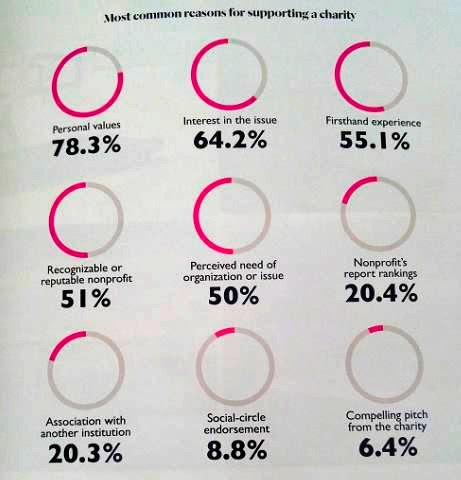Robb Report’s December issue shared a study I found utterly fascinating and a little surprising.
You will find it instructive…as long as you don’t let a few caveats distract you.
Every other year, the U.S. Trust does a survey of high-net worth households to learn about their charitable giving.
In addition to how much they donate and what organizations are raking in the biggest piles of cash — which is also both surprising and instructive — the survey tried to uncover the motivations behind it all.
The results shines a unique light on what drives people to make the decisions they do.
Here’s a quick summary of key findings that give us insight we can apply to our emails and other persuasion efforts:
1) By far, the top reason cited for making donations is the alignment of the cause/organization with their personal values — more than 12 times more than a good sales pitch. **
2) In fact, a compelling pitch is the least influential cause mentioned in this survey.
3) The top 3 reasons are all about the giver, not the organization, cause or even the perception of need.
(Which is part of the reason Stanford University’s endowment receives more funds than St. Jude’s Children’s Hospital by a wide margin).
Takeaway: It is extremely important for you to gain an intimate understanding of what really matters to your audience. Self-identity is the core from which decisions are made…and the lens through which we all see the world.
4) Association with another institution (affinity, endorsements, joint ventures) is an open door to influence.
5) Giving your would-be donor/buyer first-hand experience of what you’re doing and why you’re doing it is a powerful way to shift his perspective in a favorable way toward your business, organization or cause.
Caveats (for those who’d like to quibble):
a. Donations and purchases aren’t the same. And the motivations for giving huge gifts may be different than for small ones.
b. Millionaires may be different than non-millionaires in many ways. So these takeaways may not transfer directly.
c. Surveys are flawed because responses may not be entirely honest. People answer in ways that are flattering to themselves and supportive of their self-image.
d. Compelling sales pitches are definitely more persuasive than this survey indicates. Or at least they can be.
How do I know? Because a good sales pitch communicate the alignment with personal values, makes the donor aware of affiliations and paints the picture of need.
** In my experience, people often underestimate the impact of a well-structured sales pitch. When they make their emotional decision and justify it with logic, they’re often hesitant to admit they were won over by a pitch. They’d prefer to imagine they discovered something that lines up with what they were already thinking of doing (which, of course, is what a good pitch does).
— — —
TD;LR…
People make decisions based on their personal values and their self-image more than any other factor. As an entrepreneur and marketer, you must discover those values you share with ideal clients and align your offer with those values.
Or find someone who’s already actively looking for what you sell.

